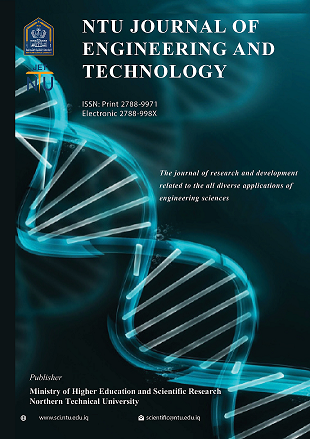Journal Cover

The NTU Journal of Engineering and Technology (NTU-JET) is a peer-reviewed journal, and it supports all themes of a respected knowledge transfer network. The journal publication's ethics and malpractice statement are primarily based on the Code of Conduct and Best-Practice Guidelines for Journal Editors (Committee on Publication Ethics, 2011), and that includes:
NTU-JET recommends authors, reviewers, and editors to read about conflicts of interest at the end of the current page.
NTU-JET follows the Committee on Publication Ethics's (COPE)’s Code of Conduct for Journal Publishers (Core practices). The publisher is dedicated to support the vast efforts of the editors, the academic contributions of authors, and the respected volunteer work undertaken by reviewers. The publisher is also responsible for ensuring that the publication system works smoothly and that ethical guidelines are applied to assist the editor, author, and reviewer in performing their ethical duties.
NTU-JET follows the Committee on Publication Ethics (COPE) Code of Conduct and Best Practice Guidelines for Journal Editors. In addition:
NTU-JET follows the Committee on Publication Ethics (COPE)'s Ethical Guidelines for Peer Reviewers. In addition:
Authors submitting papers to NTU-JET must adhere to strict guidelines regarding originality and transparency. They should not concurrently submit the same manuscript to multiple journals, nor resubmit previously published work, except in limited cases like clinical guidelines or translations where certain conditions are met. When reporting their research, authors must provide a precise, objective, and impartial account, and be willing to share their raw data upon request to facilitate editorial review and public access. Crucially, authors must guarantee the originality of their work and properly cite any use of others' content to avoid plagiarism, which is considered unethical publishing behavior. Additionally, authors are required to disclose all sources of research funding and declare any conflicts of interest. They should also ensure all significant contributors are properly acknowledged as co-authors who have approved the final manuscript. If an author becomes aware of an error in their published paper, they must promptly notify the editor and cooperate in issuing a retraction or correction. Overall, NTU-JET holds its authors to high standards of integrity, transparency, and accountability throughout the publication process.
Conflict of interest exists when an author (or the author’s institution), reviewer, or editor has financial or personal relationships that inappropriately influence (bias) his or her actions (such relationships are also known as “dual commitments”, “competing interests" or “competing loyalties”).
Editors and editorial board members are prohibited from using any unpublished information or ideas from submitted manuscripts for their own research purposes, unless they have obtained the explicit written consent of the authors. They must maintain strict confidentiality and not take advantage of privileged information gained through handling the manuscripts. Editors are required to recuse themselves from considering any manuscripts where they have conflicts of interest. This includes conflicts arising from competitive, collaborative, or other relationships and connections with the authors, companies, or institutions involved with the paper. In such cases, the editor will assign the manuscript to another member of the editorial board to handle. The key principles are that editors must uphold confidentiality, avoid misusing unpublished information, and manage conflicts of interest transparently by recusing themselves when necessary. This ensures the integrity of the editorial process and protects the rights and interests of the authors.
Any invited peer reviewers who have conflicts of interest related to the manuscript or its authors, companies, or institutions must immediately notify the editors. This includes conflicts arising from competitive, collaborative, or other relationships and connections. Reviewers with such conflicts of interest must then decline the review invitation so that alternative reviewers can be assigned. Peer reviewers are strictly prohibited from using any unpublished information or ideas disclosed in the submitted manuscripts for their own research purposes, unless they have obtained the express written consent of the authors. Reviewers must maintain confidentiality and not take advantage of the privileged information accessed during the peer review process. This duty of confidentiality and prohibition on misusing unpublished information applies even to invited reviewers who ultimately decline to review the manuscript. The integrity and fairness of the peer review process must be upheld at all times.
In summary, the key requirements for peer reviewers are to manage conflicts of interest transparently, maintain strict confidentiality, and abstain from using unpublished materials for personal gain - even if they decline the review invitation.
Authors are required to disclose any potential conflicts of interest at the earliest possible stage, generally by submitting a disclosure form along with their manuscript. This disclosure should cover any circumstances that could be perceived as influencing the results or interpretation presented in the paper. Examples of potential conflicts of interest that must be disclosed include financial ones, such as honoraria, grants, participation in speakers' bureaus, employment, stock ownership, patent-licensing, or other paid arrangements. Non-financial conflicts, like personal or professional relationships, affiliations, or beliefs relevant to the subject matter, should also be disclosed.
Additionally, authors must provide full disclosure of all sources of financial support for the research work, including any grant numbers or other reference information. The key principle is that authors must be proactive in identifying and transparently reporting any circumstances, whether financial or non-financial, that could be seen as potentially influencing the objectivity of their research and findings. This disclosure allows the journal editors and readers to evaluate the work in the appropriate context.
Journal Cover
